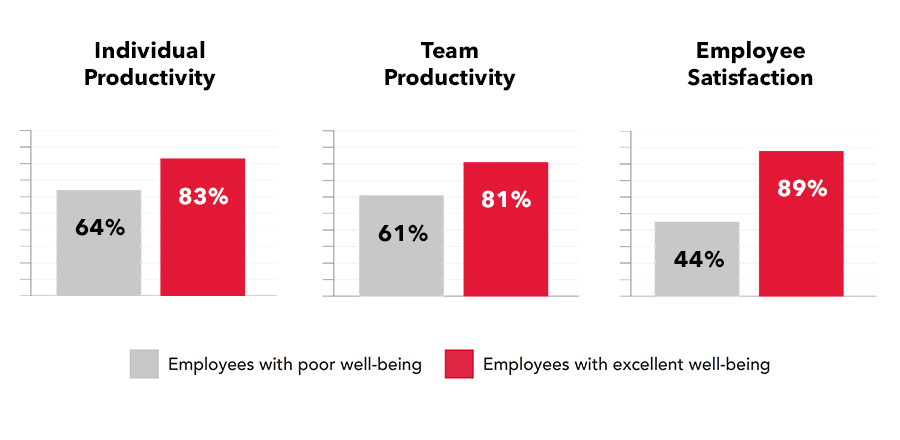
Published September 2019
Why employers are investing in well-being programs despite the rising cost of health care.
The health of your business relies on the health of your employees
Can the well-being of your workforce improve your business outcomes?
It’s a question that has lingered in recent years as employers have struggled to balance rising health care costs with competitive health benefits. But as the numbers flow in, the answer is a resounding yes.
Offering employees programs that support their path to well-being can be a differentiator for employers and can help attract and retain a diverse workforce. Benefits like reimbursement for wellness and fitness programs make it possible for employees to proactively manage their health, while coverage for holistic care—such as acupuncture and alternative medicine—provides them with support to maintain it.
Studies show that high employee well-being can boost satisfaction, teamwork, productivity, and even improve a company’s bottom line.*
Wellness is just a part of well-being
Tami Ireland, Director of Population Health Improvement at Harvard Pilgrim, explains the difference. “Wellness has been associated with traditional fitness and exercise. And well-being is this bigger notion of your sense of purpose, which is one of the biggest predictors of longevity. It’s about your community, how you’re feeling, financial wellness, and so on. It brings all of those pieces together in a more comprehensive, holistic approach.”
Putting numbers to the notion
When companies offer health benefits that support a holistic approach to improving overall well-being, the numbers follow suit:
 Individual productivity rises
Individual productivity rises
Employees considered to have poor well-being only accomplish 64% of potential work output, a far cry from the 83% accomplished by those considered to have excellent well-being.
 Team output increases
Team output increases
When team well-being goes from poor to excellent, work output goes from 61% to 81%.
 Job satisfaction doubles
Job satisfaction doubles
Only 44% of employees with poor well-being say they’re satisfied with their jobs vs. 89% satisfaction from those with excellent well-being.


Modern health plans are more like health partners
The most effective health plan offerings
Employers are shifting to a broader value proposition for health and wellness. Today’s employees are being offered programs that support their physical, mental, social, and financial health. Health plans have a vast amount of data about employee behavior and needs. Partnering with a health plan that leverages this information, to help you identify what programs and benefits best support your workforce and optimize employee well-being, is essential.
Harvard Pilgrim’s proven approach
We offer leading-edge programs and can even tailor our solutions to the specific needs of your workforce. Our group plans have an emphasis on the overall well-being of your employees, offering a variety of onsite programs from our alternative health series (e.g., Reiki and acupuncture) to planting a workplace vegetable garden. Our benefits also go beyond the workplace with more individual support, such as care management for complex conditions and personal health and lifestyle coaching.
 Mind the Moment
Mind the Moment
One of our most popular offerings is our mindfulness training program, which includes 1-hour introductory seminars, targeted workshops, multi-week courses, leadership intensives, options for remote employees, and much more. Contact us today and let our team of instructors design a flexible program that speaks to the unique needs of your employees, and grows with you as those needs change.
“Mindfulness training can help strengthen neuropathways in the brain that enhance creativity, health, and performance at work and in life.”
— Jonathan Roberts, Operations Manager for Mindfulness-Based Learning Harvard Pilgrim HealthCare
For 50 years, Harvard Pilgrim has been evolving our plans to stay on top of the needs of employers
We know how to work with you to customize our offerings to make sure they’re a good fit for your workforce. Because when employees feel supported by their health plan, it can improve workplace morale and productivity, leading to better outcomes for all.
See what we can do for you. Contact your broker and ask about Harvard Pilgrim today.
To confirm eligibility for any programs or services mentioned in this article as it relates to your specific health plan, please reach out to your account executive or HR benefits team. You may also speak to our member services team at (888)-333-4742 or by sending a secure email. And for plan details and other member resources, log in to the member portal.
